Watching the EPC light turns on while riding your Volkswagen is definitely annoying. It’s like the light is shouting, “look here, more issues need to get fixed.” But what if the EPC light turns on and, at the same time, the vehicle starts to shake weirdly?
Well, there are a variety of reasons which can be responsible for the turning on of your VW’s EPC light. However, the shaking part can be related to the EPC light, or they can actually indicate disparate issues. To be honest, most of the time, it is downright scary.
Sounds confusing? Don’t worry, as I’m about to share the reasons behind the VW CC EPC light car shaking issues and their solutions.
Driving a shaking VW CC with the EPC light on can be very risky, so I suggest you stick to the end of this article to find out the apt solutions for the problems.
What Is the EPC Light?
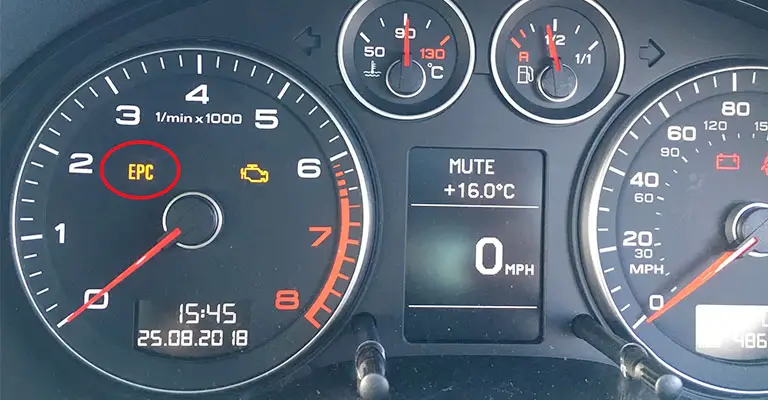
Having a good knowledge of your car’s indicator lights can be extremely helpful, especially in dire situations. But sadly, many of us don’t have a good grasp on this area.
EPC is short for Electronic Power Control. This light comes on to indicate an internal problem with your car, and typically the problem is related to the car’s throttle system.
The light serves solely as a warning light and should never be sidestepped as it often addresses various complicated issues.
You might sometimes see one or two other dashboard lights illuminated simultaneously with the EPC light. This is because the EPC system is intricately linked to a Volkswagen’s steering control unit, brake, engine functionalities, and several other systems.
As the electric power control unit often indicates complicated issues like engine speed sensor malfunction, bad accelerator pedal sensor, brake switch, throttle issues, etc., you should deal with these with an automotive professional’s assistance.
Most Common Reasons Behind Your Volkswagen CC Shaking
Your vehicle shaking or vibrating is never a good sign. Some of the issues that cause shaking are easily manageable, while the others are quite high maintenance. Let’s take a look at some of the most common issues that might cause your car to shake.
Skewed Tires
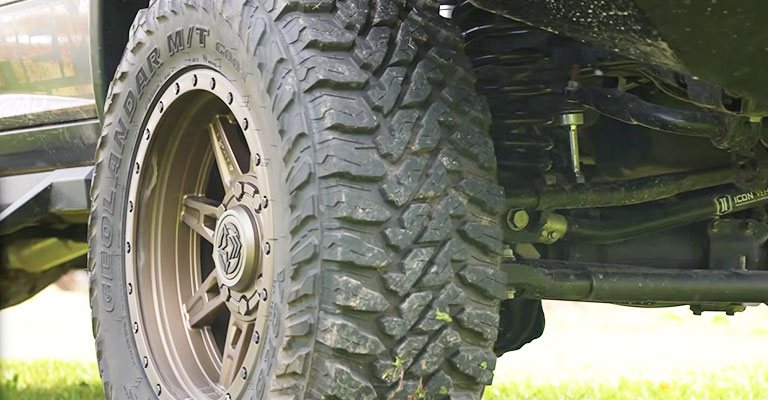
A basic reason for the shaking of your car can be any unevenness or imbalance in the structure of your vehicle. This sort of unevenness mostly results from skewed or imbalanced tires.
If the tires aren’t aligned properly or if they lack air pressure compared to the standard psi, you will likely feel the vehicle shaking as you drive. The faster you go, the shakier your vehicle will get.
Remedy
Adjusting the tires’ alignment and replenishing them with the proper amount of air pressure should take care of your problem. If it still isn’t enough, consult a professional.
Impaired Engine Mount
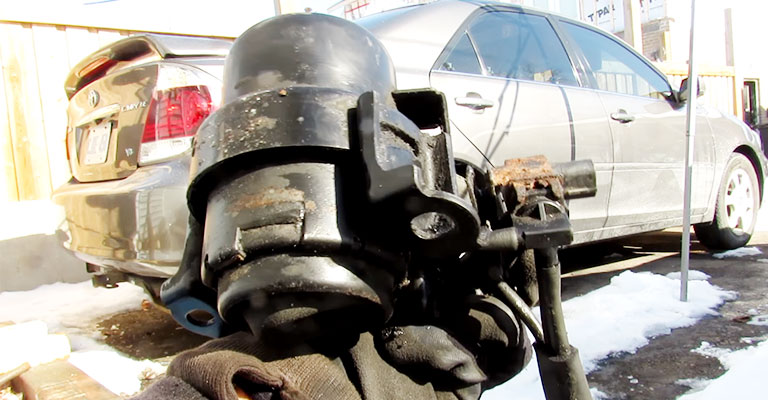
Your Volkswagen CC comes with an engine mount to keep the engine secured, bolstered, and balanced. For the engine to work properly, the mount needs to be in sound condition.
Damage to this engine mount causes the engine to become imbalanced and unsecured. Without that support, the engine won’t function properly. This will cause unusual vibration and bouncing, especially on the passenger’s side.
Remedy
Repairing the engine mount would fix your problem. If somehow the damage is too severe, you might need to replace it.
Weary Brake Pad
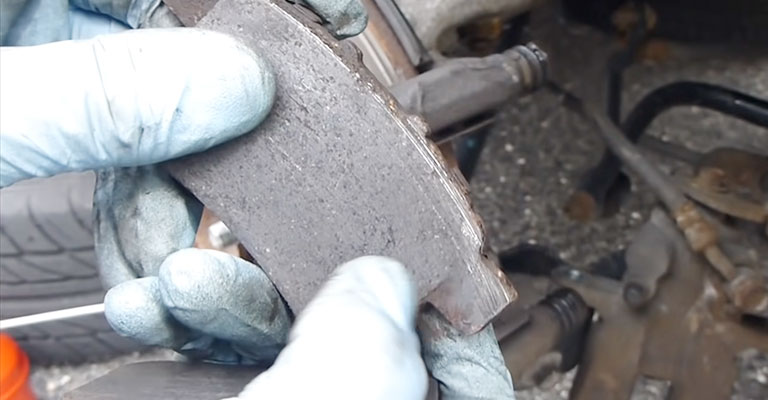
A brake pad can wear out slowly due to friction and lack of proper lubrication. A weary brake pad will cause unwanted shake or vibration whenever you apply the brake.
Don’t ignore this issue at all, and attempt to fix it as soon as you notice because the problem will quickly worsen over time. If ignored, this issue might result in a major accident later on.
Remedy
A worn-out brake pad can’t be repaired. So, to resolve your issue, you’ll need to replace the brake pad entirely.
While replacing the pad, check the rotor to make sure the pad is compatible with the car. Your mechanic can properly help you with this.
Malfunctioning Ignition Coil
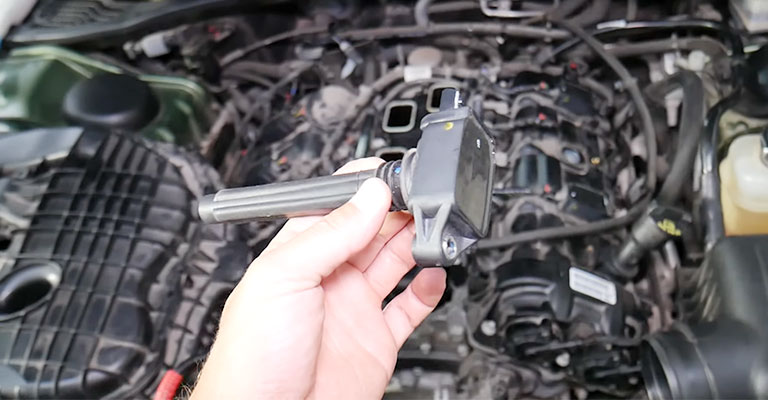
If the ignition coil of your car malfunctions, you may face poor acceleration, excessive power loss, and uncomfortable vibration of the car. Besides shaking, a bad ignition coil also causes engine misfires.
The shaking occurs when the driver attempts to start the car. It can also occur during slow driving. You’ll need an OBD scanner to figure out which cylinder is misfiring.
Lack of power and acceleration occurs due to the lack of cylinders. You can also use a spark tester to identify the misfiring cylinder.
Remedy
Replace the faulty ignition coil with a new one. Make sure the part is compatible with your car. Once again, this is something where you’d definitely want some expert opinion.
Broken Fuel Injector
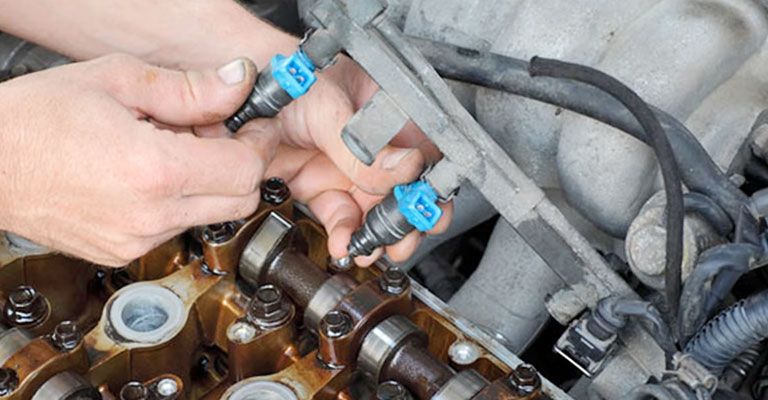
Like a faulty ignition coil, a broken fuel injector is also responsible for the misfiring of cylinders. A fuel injector sprays the fuel needed for combustion, and a broken injector can’t provide enough fuel to one or more cylinders and thus causes misfiring.
The scanner in your Volkswagen CC should assess the injector’s conditions, connections, and spraying power.
Remedy
If the problem is in the fuel injector, the best remedy for that is to replace the injector with a new and suitable one from the aftermarket.
Outdated/ Worn-Out/ Damaged Engine
A worn-out or damaged engine will have a low air level and low compression due to holes in the gasket, a decayed piston, or a worn-out tank. Moreover, low compression and weak air valve can cause engine misfiring, which results in shaking, loud noise, and many other issues.
Remedy
If the engine isn’t too old and damaged, repairing or replacing the damaged engine parts is adequate to solve this issue. In such a case, you won’t need to replace the entire engine, which can be very costly.
But if the engine’s condition is too bad and worn out, then a complete replacement of the engine is needed.
How to Utilize the EPC Warning Light
EPC light warnings can result from various issues. And some of these are easy to take care of, while others are simply not.
But how does one use the EPC warning properly to resolve the issue? Or, to be more specific, how does one turn the EPC light off?
Using OBD Scanners
Using the OBD scanners, you can easily retrieve error codes that tell you some of the causes of the EPC light warning. Hand these codes to your mechanic, and he’ll know what to do next.
Physical Check
Perform a thorough physical check for damages that might cause the EPC warning. Check the brake lights as well. Also, properly check the throttle body for clogs and loose connections.
Repairing
If a thorough physical check doesn’t turn off the EPC light, your car may need some replacing and repairing. Take your car to your trusted mechanic and perform a thorough inspection of the whole car.
After repairing the problematic parts, the EPC light will automatically turn itself off.
Frequently Asked Questions
- Should I drive a shaking Volkswagen CC with an EPC light on?
Technically, you can, but you shouldn’t. EPC light warnings are caused by many issues, and some of them can be quite menacing. An imbalanced tire or a debris-filled throttle system might not be that dangerous.
But shaking is also caused by worn-out brakes, misfiring of cylinders, etc. And these issues can result in accidents. Misfiring also contributes to excessive power loss as you’re using fewer cylinders than you’re supposed to.
- How do I reset the EPC light in my Volkswagen CC?
To reset the EPC light of your Volkswagen CC, first, start the car manually. Once the engine is running, down-press the gas pedal to the floor until the engine stops.
Remember that this technique won’t magically solve your issues. This is effective only in some instances. If this one doesn’t work, another quick way to resolve the EPC light is to make sure that all the throttle body connections are sound.
Conclusion
Do not take risks with the EPC light warnings, especially not in the case of VW CC EPC light car shaking. Your VW CC’s EPC system helps you to keep your car’s condition in check while enforcing road safety to the fullest.
If you don’t feel confident enough to deal with any automobile issue yourself, don’t be ashamed to call in for expert help and opinions.
Leave a Reply